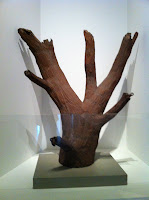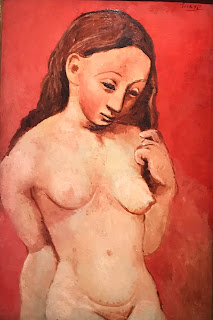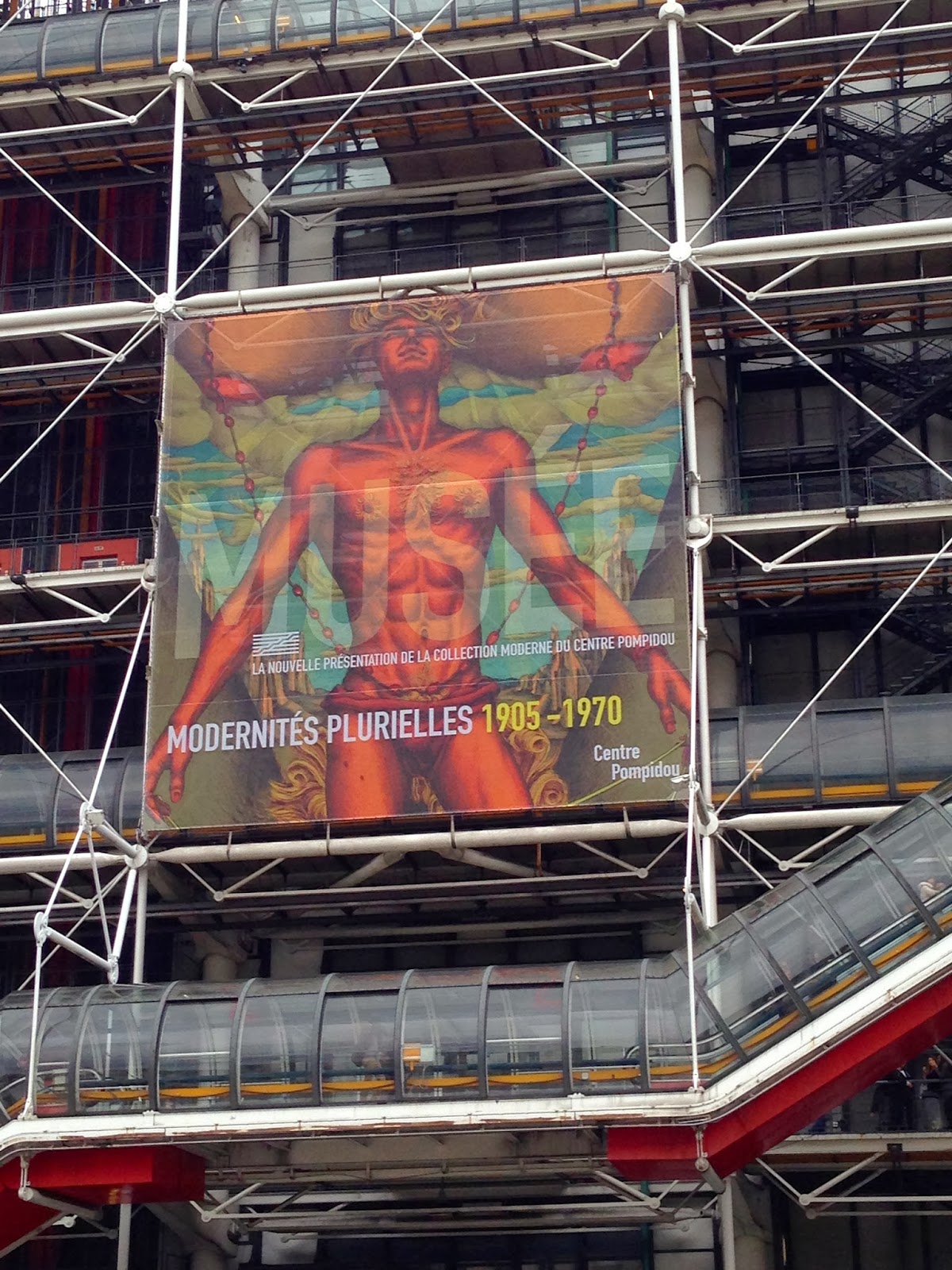A YEAR IN A WAR - 1917
How do you start talking, writing or getting your thoughts straight about the Great War of 1914-1918?
This is a huge multidisciplinary exhibition which gives an immediate view of one year of the war. «1917». Why this particular year was of extreme diversity and overly creative, I do not know. It is not an exhibition that you go from picture to picture, photo to photo or object to object - not unless you are a historian and know a lot about that period. I certainly knew something about what was going on in the art world but seeing it in this context is entirely different.
Time needs to be taken to read the texts, study the artifacts, look at the propoganda and try to understand just what was going on artistically, in the battlefields and how did the war artists (eg. Pierre Bonnard,1867-1949, Edouard Vuillard 1888-1940...) and artists who were called up such as Otto Dix, (1891-1968) cope with what they saw.
One of the real discoveries from a war point of view was the trench art. Objects made from shells and weapons. everything that one could think of. Vases, clocks, lights, lighters, chess games, decorative objects .....
No way could I show the violence, the photos which made me feel sick inside. In fact there will be no photos of war but only paintings which seemed to give some signs of hope. There are more than 800 works of art or documents shown. I wouldn’t know how many I really studied in 4 hours. Coming back in the train I read the Art magazine dedicated to th subject. It seemed very empty after what I had just seen.
It was a destructive and a constructive year. The Russian ballet (Sergueï Diaghimev) presented PARADE at the Chatelet Theatre. A collective work with the music by Erik Satie, Jean Cocteau wrote the livret and of course Picasso created the curtain, the decor and the costumes. It was a scandal and thought to be a provocation - modern music which after Debussy was considered to be outrageous during the war. Probably all before its time. The curtain which is 1050 x 1640cm is breathtaking.
This is also the year when Marcel Duchamp creates «The Fountain» , if you can call ready made a creation.
Many of Paul Strand photographs becomes known in 1917 as well. Henri Matisse was too old to go to the war but his Music lesson seems so full of hope.
Degas dies as well as Rodin. Monet who is also too old to be a soldier creates his water lilies over the war years.
The Russians who were previously exposed to European art thanks to two very well known collectors, Chtchoukine and Morozov are now deprived of such work and yet go on creating modern and abstract painting which is exploding with energy.
This is the De Stijl period in Holland. Mondrian, Van Doesburg ....
Zurich and Dada an artistic conflict again.....
The official birth of metaphysical art in Italy - De Chirico and Carlo Carrà who I always mix up with De Chirico
All these movements seem to be expressing some form of strange worrisome feature and yet looking at them, would you think that it had something to do with the war ?
Even the camouflage was artistic. In fact from a little way off, was it a real tree?
Otto Dix is even more radical « I draw and paint in a contradictory spirit and hope to show the world how ugly, sick and deceptive it is».
So many artists that we all know and so many I love belonged to that period....
Raoul Duffy (1877-1953), Paul Klee (1871946), Emil Nolde (1886-1956), Felix Vallotton (1865-1925), George Grosz (1893-1859), Kandisky (1886-1944) - and more, Henri Laurens, Metzinger, Matisse, Modigliani, Richter, Rotluff, Popova, Leger, Braque, Giacometti, Brancussi, Juan Gris, Malevitch, Larinov, ....and I don’t have to add Picasso, do I ? And I have only mentionned a few....
This is a huge multidisciplinary exhibition which gives an immediate view of one year of the war. «1917». Why this particular year was of extreme diversity and overly creative, I do not know. It is not an exhibition that you go from picture to picture, photo to photo or object to object - not unless you are a historian and know a lot about that period. I certainly knew something about what was going on in the art world but seeing it in this context is entirely different.
 |
| One of the many propoganda posters |
Time needs to be taken to read the texts, study the artifacts, look at the propoganda and try to understand just what was going on artistically, in the battlefields and how did the war artists (eg. Pierre Bonnard,1867-1949, Edouard Vuillard 1888-1940...) and artists who were called up such as Otto Dix, (1891-1968) cope with what they saw.
 |
| Otto Dix - Destroyed village |
 |
| Pierre Bonnard - A village in ruins |
One of the real discoveries from a war point of view was the trench art. Objects made from shells and weapons. everything that one could think of. Vases, clocks, lights, lighters, chess games, decorative objects .....
 |
| Australian Trench art |
 |
| Display of Trench art |
No way could I show the violence, the photos which made me feel sick inside. In fact there will be no photos of war but only paintings which seemed to give some signs of hope. There are more than 800 works of art or documents shown. I wouldn’t know how many I really studied in 4 hours. Coming back in the train I read the Art magazine dedicated to th subject. It seemed very empty after what I had just seen.
It was a destructive and a constructive year. The Russian ballet (Sergueï Diaghimev) presented PARADE at the Chatelet Theatre. A collective work with the music by Erik Satie, Jean Cocteau wrote the livret and of course Picasso created the curtain, the decor and the costumes. It was a scandal and thought to be a provocation - modern music which after Debussy was considered to be outrageous during the war. Probably all before its time. The curtain which is 1050 x 1640cm is breathtaking.
 |
| Admiring Picasso's curtain |
 |
| Part of the curtain |
 |
| Marcel Duchamp - 1917 Ready made |
This is also the year when Marcel Duchamp creates «The Fountain» , if you can call ready made a creation.
 |
| The Music Lesson - Matisse |
Degas dies as well as Rodin. Monet who is also too old to be a soldier creates his water lilies over the war years.
 |
| Manet et the water lilies |
 |
| Water lilies |
The Russians who were previously exposed to European art thanks to two very well known collectors, Chtchoukine and Morozov are now deprived of such work and yet go on creating modern and abstract painting which is exploding with energy.
 |
| Kandinsky |
 |
| Van Doesburg "The Cow" |
 |
| Mondrian |
 |
| Marcel Janco -Tristan |
Zurich and Dada an artistic conflict again.....
The official birth of metaphysical art in Italy - De Chirico and Carlo Carrà who I always mix up with De Chirico
 |
| De Chirico - Hector and Andromaque |
 |
| Carlo Carra " The enchanted room" |
 |
| A tree? |
Even the camouflage was artistic. In fact from a little way off, was it a real tree?
When it is over, how do you come back to some form or reality ? Masson answered the question. Are Masson’s words a summary of what all artists who fought felt ? «It is the war which made me feel closer to others. Before I lived totally alone. The war pushed me into the humain humus , made me a man. It’s dreadful to say but I feel that I have entered a community with those who are alike me»
 |
| Otto Dix |
Otto Dix is even more radical « I draw and paint in a contradictory spirit and hope to show the world how ugly, sick and deceptive it is».
 |
| Antoine Peysner - Carnaval Portrait |
So many artists that we all know and so many I love belonged to that period....
Raoul Duffy (1877-1953), Paul Klee (1871946), Emil Nolde (1886-1956), Felix Vallotton (1865-1925), George Grosz (1893-1859), Kandisky (1886-1944) - and more, Henri Laurens, Metzinger, Matisse, Modigliani, Richter, Rotluff, Popova, Leger, Braque, Giacometti, Brancussi, Juan Gris, Malevitch, Larinov, ....and I don’t have to add Picasso, do I ? And I have only mentionned a few....
 |
| Juan Gris "Arlequin with guitare " |
 |
| Picasso |
 |
| Raoul Haussman |
 |
| Hans Richter |
 |
| Popova ? |
 |
| Jonathan Itten - Self Portrait |



Commentaires